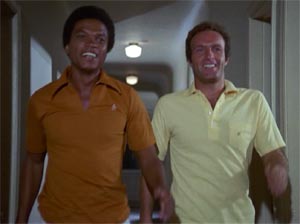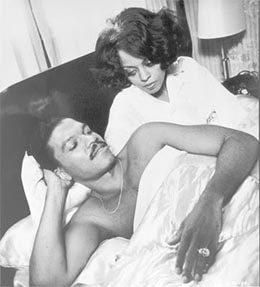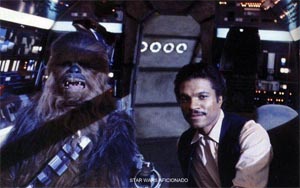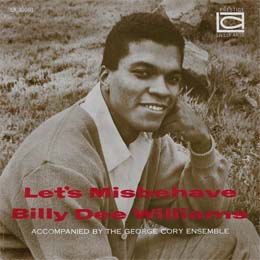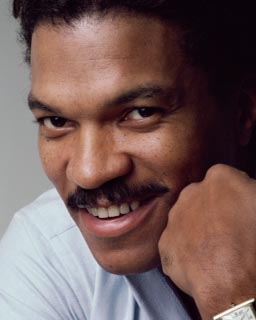
by Michael P. Coleman
After Disney announced they were reuniting the cast of Star Wars for a new film, conspicuously without screen legend Billy Dee Williams, I reached out to Disney. They had no comment. I then reached out to Williams. He had one.
“I don’t know what they’re doing at this point,” Williams said. “But listen, I have made my mark with Lando Calrissian. If they choose to bring him back, I’d be happy to play Lando again. But they’ve decided to take a different direction, at least for this movie.”
While I had Williams’ attention, I asked for a little more time, as I’ve always wanted to talk to him about his impressive career including, most recently, his very short stint on ABC’s Dancing With The Stars last spring. An old back injury caused Williams to leave the show after just a couple of episodes.
“I’ve always been a fan of the show, but boy oh boy, watching from your couch in your living room is a lot different than the hours and hours of preparation that precede each week’s performance,” Williams said, adding “It’s a LOT harder than acting!”
I had caught up to Williams about an hour before a physical therapy appointment, and as he had some time to kill, I took advantage of a once-in-a -lifetime opportunity to talk to the man who stole the legendary Diana Ross away from me, first in 1972’s groundbreaking Lady Sings The Blues. Williams graciously shared his insider’s view of the making of Lady, Mahogany, and many of his other films, the scoop on working with Ross and James Caan, and how he wound up “…in a galaxy far, far away” in the Star Wars movies.
The 77-year-old legend also shared details on lesser known aspects of his career, including his brief foray into singing, details on his successful career as an artist, and why he insists that he cried his way into show business!
Most cite Brian‘s Song as your acting debut, but you made your debut on Broadway when you were seven years old! What do you recall about that experience?
It was in “The Firebrand of Florence”, a musical. My mother was working as an elevator operator and secretary at a local theatre, and learned they were looking for a cute little brown-skinned boy for the production. I happen to fit that description, and they asked my mom to have me audition. They asked me to walk across the stage twice, and I wanted to do it a third time. They told me no, so I started crying – and they told me if I’d stop crying they’d hire me. I always say that I cried my way into show business!
How long did that Broadway run last?
It was a resounding flop, primarily because the writers were German and had just escaped Nazi Germany. At that particularly time, in the 1940s, there was not much sympathy for them here, nor was there support for the work that they were doing.
Did that early experience prompt you to pursue acting as a profession, or did that desire come later?
I had that one experience, and luckily I led a normal child’s life after that. It wasn’t until later when I was reintroduced to acting, in high school. When I got a scholarship to the art school that I went to, I just sort of segued back into the acting thing.
Your acting seems to come so naturally to you. Did you train professionally?
I did, even studying under Sidney Pointier for a moment.
Your first film was “The Last Angry Man“. What do you recall of that experience?
That was my first movie for Columbia Pictures, and I was about 22 years old. And it was with one of the great actors of the time, Paul Muni who was the original Scarface. Luther Adler was another actor, who was a great actor of the time. It was a propitious experience, because I was working with such an amazing cast.
How did you wind up with a first experience with such a formidable cast, for a major studio like Columbia?
I didn’t even have to audition. The director and I met, and at the end of the conversation he offered me the role. I’ve always felt that the whole show business things wasn’t something that I looked for, but rather it looked for me. I feel I was destined for this whole experience.
A few years later you wound up in Brian‘s Song. You earned an Emmy nomination for it – how did that project come about?
That experience was an act of love. It was a rare, special moment in my life and career. Louis Gossett Jr. was to have played the character, but he had been playing basketball one weekend and hurt himself, so they had to look for someone else. I happened to have been in California at the time, having just broken up with my second wife, and I was in a miserable state of mind. So when I got the audition, my state of mind was perfect for the reading that I had to do. The misery in my personal life wound up getting me that phenomenal role.
Your chemistry with Caan is undeniable. That type of friendship between two men of two different ethnicities hadn‘t really been seen on film prior to that.
It was quite different, and monumental in people’s lives. I’ve run into many people who say they were deeply touched by that whole experience. I continue to be honored to hear that.
Did your performance in Brian‘s Song and its success lead you to Berry Gordy, Motown, and Lady Sings The Blues?
Motown thing had me come in and audition. I didn’t have my glasses with me, so I couldn’t really read the script properly – I thought it was a REALLY bad audition. But Berry Gordy got a big kick out of it, and he had me meet Diana. She and I had a great chemistry. They then had me do a screen test, and afterward Paramount wasn’t really interested in me. They wanted Paul Winfield to play Louis McKay. But Berry had fallen in love with me, and thought that I would be perfect, so he had to convince everyone at Paramount that I should play that character. I guess it all worked out the way it was supposed to.
I would say so! Mr. Gordy absolutely has an eye for chemistry and bringing different elements together. I don‘t know that I can recall another film team that had more chemistry than you and Diana Ross. What was working with her like?
We had a great time. We were like little kids on the set, really. We just fed off of each other in a very natural, beautiful way. It was a very special experience, again one that was meant to be. I became, really, Hollywood’s first romantic lead who was a brown-skinned boy. That hadn’t happened on screen at that point.
I could argue that no one‘s followed you, yet. There have been African American movie stars – Denzel, Will Smith, I could go on and on – but I don‘t know that another black man has been cast as a romantic lead. And you did it twice with Diana, following Lady Sings The Blues up with Mahogany. I don‘t think Hollywood‘s caught up with the work that you, Gordy and Ross did, over 40 years ago.
Well, thank you. I appreciate that. I sometimes feel that those two experiences need to be discussed a lot more. I really think it was groundbreaking, beautiful work, and I’m proud to have been a part of it. It was very special.
You had a third experience with Ross on film. In 1987, you were a guest on Ross‘ ABC special, “Red Hot Rhythm & Blues“. It was such a playful, great performance and the chemistry was still there. Would you consider working with Ross again?
Yeah! I’ve been trying to for years, but she’s…difficult. [Laughs] .
In what way?
Well, I’m being facetious really…I think ALL of those ladies are difficult, all of those divas. I’ve worked with quite a few of them, and they’re all crazy – but wonderfully crazy! I’m absolutely in love with Diana, and I think people would love to see the two of us back on the screen together.
A few years later, you showed up in the Star Wars universe. My brother dragged me into the first film, and I remember wondering “Where are all of the black people in this universe?” How‘d you integrate The Empire Strikes Back?
Well, George Lucas had received so much flack for Darth Vader. He figured he needed to rectify that, and he brought Lando in. And once again, they came to me and asked me to play that character. No one else can play him! I’m Lando! I try to give a real identify to all of the characters I play, so that they’ll be remembered. I won’t even let other people do voiceovers for Lando. I’ve been told my voice is distinctive – I don’t want anyone to forget that I created these characters.
Lando was absolutely a peer with the other characters in those films, as well as in Return Of The Jedi. You always seemed to level the playing field without really trying very hard.
Well, thank you very much. I appreciate that. Even with my paintings, I don’t limit myself to being an African American artist. I don’t limit myself to being a black man on the screen. Everything I do revolves around the point of view of being bigger than life. It’s always been a question of transcending the usual, stereotypical ways of depicting a character. I tend of think of myself as an individual with an unique point of view. So, it’s more about being bigger than life. I was raised that way, with that kind of perspective.
Speaking of your art, what led you to your painting? Where did that part of your artistic expression come from?
Well, my sister and I had always been artists. We were both accepted to a high school for gifted kids, and painting & drawing has always been a part of my life.
Tell me about your art. You call it “abstract reality“.
Well, as real as things are, I allow the viewer to bring their own experiences to the viewing experience. So it gives my pieces a lot of movement, and makes them more interesting.
Do you have any future exhibits planned on the west coast? Will you bring your work to northern California?
I used to exhibit in LA at a gallery that’s not around any more. I haven’t really exhibited in a long time, other than up in Canada. I’m thinking about doing something again really soon. I’ve done some in San Francisco as well. I’d actually prefer to exhibit in northern California than in LA.
Why‘s that?
I don’t know – I find the people in northern California to be much more sophisticated about art.
We‘ll look for you here, sometime soon. I‘ve read that the need for you to raise money as a struggling art student led you to try acting. Is that a really well written line in your bio, or is there truth to that?
It’s true! I had to make money for canvases and paint, and I started doing work as an extra for television. I got drawn further and further into it, so I started studying acting. I never liked regular jobs – I was never really good at them! [Laughs]
You‘re so good at irregular ones that you didn‘t have to be!
Thank you.
Speaking of “irregular” jobs, you recorded an album of standards, back in the 1960s.
Yeah, I had done “A Taste Of Honey”. It was written for me, for the stage. During that period, a jazz label approached me about recording an album, and I went for it. I wasn’t really a singer, but there was some discussion about me pursuing that as a career. So I recorded an album called Let‘s Misbehave with Billy Dee Williams. I just found out that a company in Europe wants to do a whole reissue of that album. I’m told it’s going to be released this fall.
I can‘t wait to hear it!
Yes, you can — it was a terrible album! [Laughs] Some of it was OK, but most of it was bad. I wasn’t really experienced with that stuff, but they were training me to be a chic nightclub singer, a chanteur. Some of it was not too bad, but a lot of it was not too great. [Laughs]
Before we wrap up, I have to tell you that I loved your guest spot on Modern Family. You did a great job spoofing yourself.
[Laughs} Thanks! I have spent a lot of time parodying myself. It’s a lot of fun – and is a real compliment, actually. At this stage in my life, I’m just enjoying myself.
Michael P. Coleman is a Sacramento-based freelance writer. When he‘s not tipping back a cold Colt 45, you can catch him at michaelpcoleman.com or on Twitter: @ColemanMichaelP
